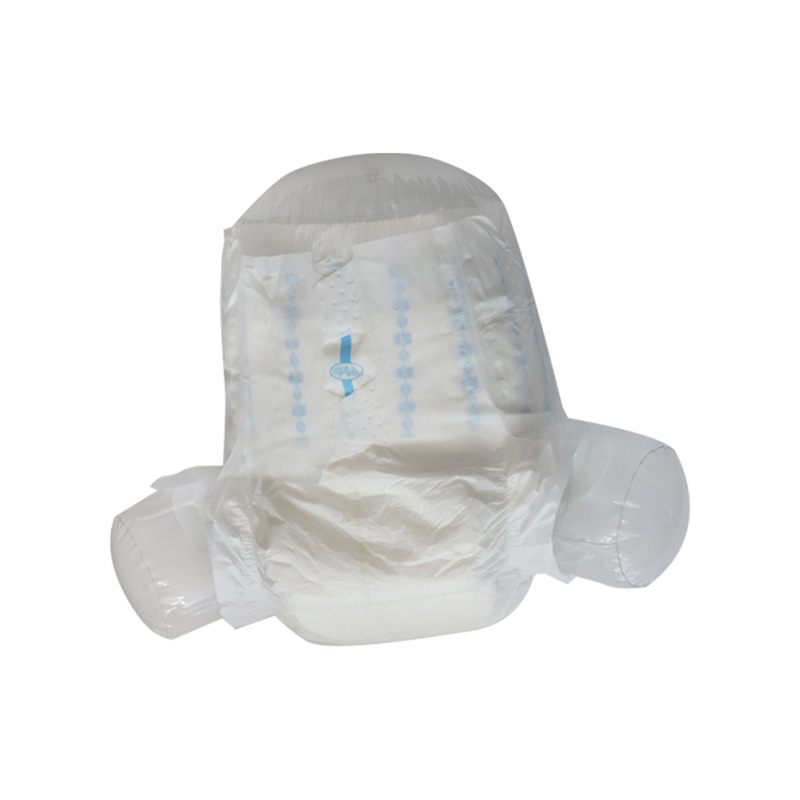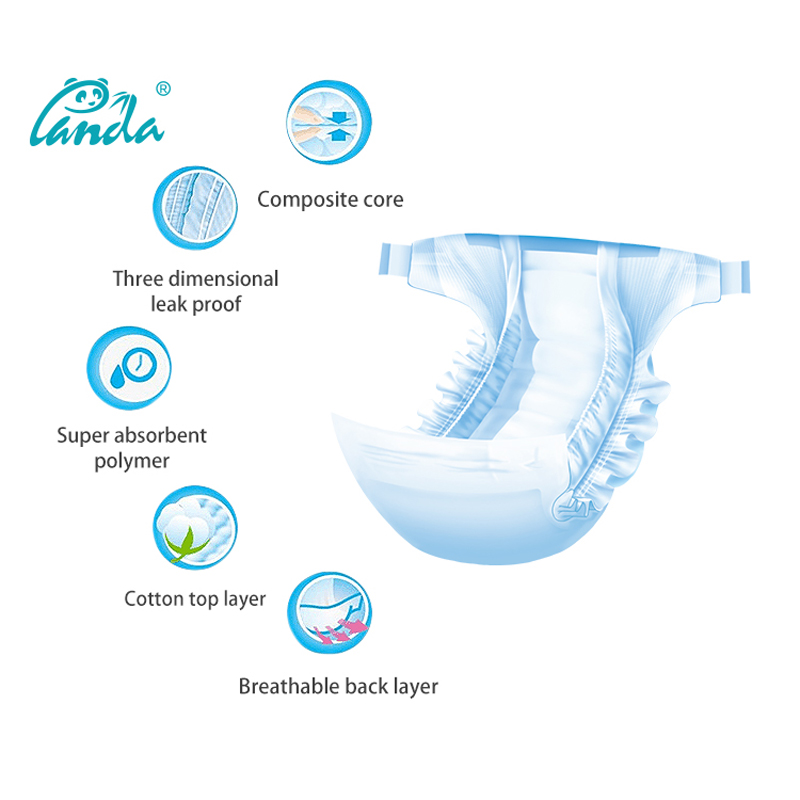Shirley Bloxom can’t forget the pride-swallowing shame she felt asking friends and church members for financial help.
This story also ran on Tampa Bay Times. It can be republished for free. Adult Diaper Panties Products

After surgery left her husband partially paralyzed, he needed to use disposable underwear at least three times a day, said Bloxom, 72. Living on a fixed income, the couple couldn’t afford them.
Bloxom’s husband is among the estimated 2.5 million older Floridians who use incontinence products, like pads and adult diapers, daily. But with over a tenth of the Sunshine State’s seniors living in poverty, many struggle to pay for the supplies they need.
Last month, Florida joined a growing number of states that are banning sales taxes on diapers to make them more affordable for older adults and families with young children. Florida is one of the United States’ top three destination states for retirees, with about 21% of its residents age 65 or older.
“So it affects more people in Florida than it does in other places,” said state Sen. Jay Trumbull, a Republican.
Fifteen other states, including California, Louisiana, and Minnesota, as well as the District of Columbia, have permanently eliminated the diaper tax, according to the National Diaper Bank Network. (Five others do not have sales taxes in general.)
Exemptions can vary widely. Some states ban taxes on diapers but no other incontinence products; others exempt taxes only on diapers purchased with a doctor’s prescription. Florida’s effort is particularly comprehensive — eliminating sales taxes on both baby diapers and adult incontinence supplies.
The measure will reduce the state’s general revenue by about $54.4 million annually after its first year, according to a Florida Senate analysis. That money could make a huge difference in the lives of everyday Floridians, said Rima Nathan, a professor and the director of the Claude Pepper Elder Law Clinic at Florida State University.
Eliminating taxes on the products could save an adult who uses four or five diapers a day about $18 a month, according to a clinic analysis.
Though diapers, including for babies, are essential for many, they are not covered by food stamps. Nor are incontinence products for older adults typically covered by Medicare.
The cost can easily add up on a fixed income.
Subscribe to KFF Health News' free Morning Briefing.
The Bloxoms receive $2,500 a month through Social Security. With medical copays, groceries, and mortgage payments, the money dries up quickly, Shirley Bloxom said.
Bloxom, who lives in Tallahassee, said she knows too many friends who have sat in unchanged incontinence products, stretching their luck and resources thin because money was tight.
“This stuff does not come cheap,” she said. “I can understand why some people let their loved ones sit there in that kind of condition. Because they don’t have the money.”
Karla Muñoz, a manager of aging services for Florida’s Hillsborough County, said the region’s older adults can spend about $100 a month on incontinence products. About half of the low-income seniors served by the county rely on these supplies, she said.
Lacking clean diapers can have a social cost. Seniors may avoid activities with grandchildren or friends, putting them at risk of isolation, which is linked to poorer health outcomes.
“Sometimes, they’ll have a tendency to use them a little bit longer, and that poses health risks,” Muñoz said. “They could develop bedsores, and now you’re talking about hospitalizations.”
Eliminating sales taxes has long been considered a way to make essential items more affordable. Many states, including Florida, have removed taxes on period products, for example.
For the past year, the Sunshine State has had a temporary pause on taxing diapers for infants, through a relief package Republican Gov. Ron DeSantis signed last May. But the one-year ban did not apply to products for older adults.
“I just didn’t think it was fair to ignore one over the other — especially knowing many seniors are on a fixed income,” said state Rep. Anna Eskamani, a Democrat, who has proposed bills in the past three legislative sessions that would ban taxes on all incontinence products. “Every penny does count.”
This year’s tax bill, which sailed through the Florida Legislature owing to a bipartisan push, made the diaper tax ban permanent — and extended it to senior incontinence products.
The relief package provides a sales tax exemption for diapers, incontinence undergarments, pads, and liners. DeSantis signed it into law on May 25.
The Sunshine State joined Iowa, Virginia, and North Dakota in permanently banning sales taxes on diapers this year.
The Bloxoms were eventually connected to Elder Care Services, a local nonprofit that provides support to low-income seniors in northeastern Florida. Because of the program, they no longer pay for diapers.
“It has been a lifesaver,” Shirley Bloxom said.
This article was produced in partnership with the Tampa Bay Times. The Foundation for a Healthy St. Petersburg also provided funding for this report.
Hannah Critchfield, Tampa Bay Times: @HannaCritch
We want to hear from you: Contact Us
By Hannah Critchfield, Tampa Bay Times June 29, 2023
Shirley Bloxom can’t forget the pride-swallowing shame she felt asking friends and church members for financial help.
After surgery left her husband partially paralyzed, he needed to use disposable underwear at least three times a day, said Bloxom, 72. Living on a fixed income, the couple couldn’t afford them.
Bloxom’s husband is among the estimated 2.5 million older Floridians who use incontinence products, like pads and adult diapers, daily. But with over a tenth of the Sunshine State’s seniors living in poverty, many struggle to pay for the supplies they need.
Last month, Florida joined a growing number of states that are banning sales taxes on diapers to make them more affordable for older adults and families with young children. Florida is one of the United States’ top three destination states for retirees, with about 21% of its residents age 65 or older.
“So it affects more people in Florida than it does in other places,” said state Sen. Jay Trumbull, a Republican.
Fifteen other states, including California, Louisiana, and Minnesota, as well as the District of Columbia, have permanently eliminated the diaper tax, according to the National Diaper Bank Network. (Five others do not have sales taxes in general.)
Exemptions can vary widely. Some states ban taxes on diapers but no other incontinence products; others exempt taxes only on diapers purchased with a doctor’s prescription. Florida’s effort is particularly comprehensive — eliminating sales taxes on both baby diapers and adult incontinence supplies.
The measure will reduce the state’s general revenue by about $54.4 million annually after its first year, according to a Florida Senate analysis. That money could make a huge difference in the lives of everyday Floridians, said Rima Nathan, a professor and the director of the Claude Pepper Elder Law Clinic at Florida State University.
Eliminating taxes on the products could save an adult who uses four or five diapers a day about $18 a month, according to a clinic analysis.
Though diapers, including for babies, are essential for many, they are not covered by food stamps. Nor are incontinence products for older adults typically covered by Medicare.
The cost can easily add up on a fixed income.
The Bloxoms receive $2,500 a month through Social Security. With medical copays, groceries, and mortgage payments, the money dries up quickly, Shirley Bloxom said.
Bloxom, who lives in Tallahassee, said she knows too many friends who have sat in unchanged incontinence products, stretching their luck and resources thin because money was tight.
“This stuff does not come cheap,” she said. “I can understand why some people let their loved ones sit there in that kind of condition. Because they don’t have the money.”
Karla Muñoz, a manager of aging services for Florida’s Hillsborough County, said the region’s older adults can spend about $100 a month on incontinence products. About half of the low-income seniors served by the county rely on these supplies, she said.
Lacking clean diapers can have a social cost. Seniors may avoid activities with grandchildren or friends, putting them at risk of isolation, which is linked to poorer health outcomes.
“Sometimes, they’ll have a tendency to use them a little bit longer, and that poses health risks,” Muñoz said. “They could develop bedsores, and now you’re talking about hospitalizations.”
Eliminating sales taxes has long been considered a way to make essential items more affordable. Many states, including Florida, have removed taxes on period products, for example.
For the past year, the Sunshine State has had a temporary pause on taxing diapers for infants, through a relief package Republican Gov. Ron DeSantis signed last May. But the one-year ban did not apply to products for older adults.
“I just didn’t think it was fair to ignore one over the other — especially knowing many seniors are on a fixed income,” said state Rep. Anna Eskamani, a Democrat, who has proposed bills in the past three legislative sessions that would ban taxes on all incontinence products. “Every penny does count.”
This year’s tax bill, which sailed through the Florida Legislature owing to a bipartisan push, made the diaper tax ban permanent — and extended it to senior incontinence products.
The relief package provides a sales tax exemption for diapers, incontinence undergarments, pads, and liners. DeSantis signed it into law on May 25.
The Sunshine State joined Iowa, Virginia, and North Dakota in permanently banning sales taxes on diapers this year.
The Bloxoms were eventually connected to Elder Care Services, a local nonprofit that provides support to low-income seniors in northeastern Florida. Because of the program, they no longer pay for diapers.
“It has been a lifesaver,” Shirley Bloxom said.
This article was produced in partnership with the Tampa Bay Times. The Foundation for a Healthy St. Petersburg also provided funding for this report.
We encourage organizations to republish our content, free of charge. Here’s what we ask:
You must credit us as the original publisher, with a hyperlink to our kffhealthnews.org site. If possible, please include the original author(s) and KFF Health News” in the byline. Please preserve the hyperlinks in the story.
It’s important to note, not everything on kffhealthnews.org is available for republishing. If a story is labeled “All Rights Reserved,” we cannot grant permission to republish that item.
Have questions? Let us know at KHNHelp@kff.org
Feds Hope to Cut Sepsis Deaths by Hitching Medicare Payments to Treatment Stats
John Green vs. Johnson & Johnson (Part 1)
Narcan, Now Available Without a Prescription, Can Still Be Hard to Get
Thousands Got Exactech Knee or Hip Replacements. Then, Patients Say, the Parts Began to Fail.
© 2023 KFF. All rights reserved.
Thank you for your interest in supporting Kaiser Health News (KHN), the nation’s leading nonprofit newsroom focused on health and health policy. We distribute our journalism for free and without advertising through media partners of all sizes and in communities large and small. We appreciate all forms of engagement from our readers and listeners, and welcome your support.
KHN is an editorially independent program of KFF (Kaiser Family Foundation). You can support KHN by making a contribution to KFF, a non-profit charitable organization that is not associated with Kaiser Permanente.

Extra Large Dog Potty Pads Click the button below to go to KFF’s donation page which will provide more information and FAQs. Thank you!